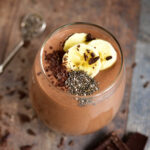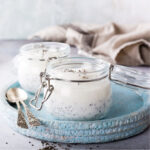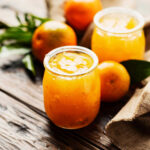The best coconut sugar substitute, that matches the flavour and texture (structure) of coconut sugar is light brown sugar.
If you want to add more flavour you can also use dark brown sugar or demerara sugar (perhaps mixed a bit with regular caster – fine sugar or light brown sugar).
Replacements for coconut sugar that work in some recipes (usually not baking or cake making) are various natural sugar syrups; these are great in matching the flavour of coconut sugar and are also fairly healthy. But, they have a completely different structure (they are liquid) so they might not work that well in baking recipes.
The best coconut sugar substitutes to make sure you get the flavour & colour right for your recipe
- Light Brown Sugar
- Brown Sugar
- Dark Brown sugar + Caster White Sugar (50% & 50% mix)
- Demerera Sugar + Caster White Sugar (50& & 50% mix)
- Mollasess Sugar + Caster White Sugar (30% & 70 % mix – approx)

Light brown sugar
Light brown sugar is probably the easiest way to replace coconut sugar. It’s affordable (much cheaper than coconut sugar), it has the same colour, structure and will behave the same as coconut sugar when you bake with it. The only thing that will be different is the flavour as coconut sugar has a faint taste of coconut, which, of course, you won’t have with regular light sugar.
Use the same amount of light brown sugar to replace the coconut sugar.
I like to use light brown sugar or coconut sugar in my soft pretzels recipe because it adds a great flavour and colour.
Golden Caster Sugar
Slightly less processed than regular white sugar, golden caster sugar is a great replacement for coconut sugar in the terms of structure (about the same size sugar crystals). The taste and flavour is much lighter than coconut sugar.
Use the same amount of golden caster sugar to replace coconut sugar.

Dark brown sugar (diluted/cut with white caster/fine sugar)
Brown or dark brown sugar is great flavour sugar with a great use around the kitchen. You can make a healthier versions of muffins, cakes, brownies and make deliciously flavoured brown sugar syrup recipes with it too.
Dark brown sugar will have a much richer flavour than coconut sugar, so if you are worried about that, use about 50% dark brown sugar and mix it with either light brown sugar or regular white or caster sugar.
Use the same amount of dark brown sugar (or mixed with white sugar) to replace coconut sugar.
Sucanat or Rapadura Sugar
Sucanat sugar also known as rapadura sugar in the UK has about the same amount of calories as regular white sugar, but it does have more antioxidants and minerals than regular sugars.
It’s also a lot more expensive than regular or brown sugar and about the same cost as coconut sugar, which means you’d be replacing coconut sugar with an equally costly option. It does, however have a great flavour, deep and rich caramel flavour similar to a brown or a light brown sugar.
Use the same amount of sucanat or rapadura sugar to replace coconut sugar.
Regular sugar – caster sugar or granulated sugar
Since coconut sugar has the same amount of calories as regular sugar, I though I’d mention it too. If you are on a budget, regular white sugar is far the most affordable option from my list of coconut sugar substitutions. However if you are after the nutritional value and you’d like something slightly more healthier than regular sugar, then you’ll probably leave white sugar out.
I’ve previously used a mix of caster sugar and dark brown sugar to replace coconut sugar in baking and it worked really well. I’m just mentioning this, because if you run out of all the other coconut sugar substitutions, you might like to know that you can also use a mix of similar sugars and make the amount go further by adding caster or granulated sugar.
Molasses sugar (mixed with white caster sugar)
Molasses sugar is very rich in flavour – it almost reminds me liquorice, when it’s completely melted. Molasses sugar is great to use in traditional gingerbread tray bake, chocolate loaf cakes and other rich flavoured cakes. Molasses sugar, on it’s own would be too strong as a flavour, so I’d recommend to mix molasses sugar with white caster sugar about 1/3 molasses sugar and 2/3 white caster sugar.
Muscavado sugar
Muscavado sugar is slightly darker than dark brown sugar. You can easily use muscovado sugar instead of coconut sugar, but I would again mix it with some white caster sugar – about 50% muscovado sugar and 50% white caster sugar.
Demerera sugar
Demerera sugar sits in between light brown sugar and dark brown sugar in the terms of flavour. You can use it as it is to replace coconut sugar in baking or cooking ( like for like – e.g. 100% demerera sugar replacing 100% coconut sugar).
Stevia granulated sugar
Stevia is also natural sugar, which can easily replace coconut sugar. The only thing to bear in mind is that stevia is slightly lighter than coconut sugar, so I normally use a little more than what the recipe indicates. For most recipes this could be something like 100 % coconut sugar replaced by 120% of stevia.
Stevia doesn’t have much flavour or colour, so if this is important for you (or the final flavour of your recipe), then I would probably opt for another alternative such as light brown sugar.

Liquid sweeteners
Natural liquid sweeteners are also good alternatives for coconut sugar. Saying that, liquid sweeteners have a completely different structure ( they are liquid after all!) which means that you need to be careful where you use them.
Any liquid sweetener will be fine as a replacement for coconut sugar in sauces, puddings, syrups or anything else that’s liquid. It will be also fine in any baking recipe, that uses a little coconut sugar (up to a few teaspoons) for example yeasted pancakes, bread, sweet breads such as brioche, sourdough bread, rolls etc.
Liquid sweeteners are also great replacements for coconut sugar where the sugar is meant to melt or bake in, such as baked fruit, flavoured meat, bacon or similar.
Replacing coconut sugar in cake baking
It’s a little more complicated when you try to replace coconut sugar with liquid sweeteners in baking. If the recipe calls for a lot of sugar, it means that it also needs the structure of sugar for the bake (usually cake or loaf cake) to work.
If you replace the same amount of liquid syrup for coconut sugar in cake batter, you’ll end up with a very liquid batter that might not bake in the recipe original time. This means that you’ll need to adjust the baking time, but also add less liquid sugar and up the flour (or whatever else it’s in the recipe that’s ‘dry’ ingredient).
This is often a bit of a trial and error type of exercise, so I would look for recipes (especially for cakes, cupcakes or tray bakes) that already have a liquid sweetener in and somebody has actually tested the recipe quantities with the liquid sweetener and not a granulated (regular) sugar (of any type).
Honey
Honey is an easy coconut sugar replacement as it’s widely available. If you happen to have a darker honey (such as forest or pine honey), the flavour will be richer and the colour darker – mimicking the flavour and colour of a coconut sugar.
Date syrup
Although you probably won’t find date syrup in regular supermarket, they are usually stocked by Mediterian food shops, where date syrup is quite common sweetener. As you can imagine, date syrup is thick, sweet and has a very rich flavour.
Agave syrup
Agave syrup is slightly less pricey than maple syrup and it’s usually used for drizzling on breakfast pancakes or baking healthy granola bars or muffins.
Maple syrup
Although maple syrup is a great replacement for coconut sugar as it’s natural, less sweet and suitable for people with IBS, it’s also fairly pricey.
A lot of maple syrups are blended with cheaper syrups, such as carob, golden syrup or honey, which is great if you are looking after your money, but if you want the real maple syrup, the prices can be quite high.
Golden syrup
Golden syrup is easily available and more budget friendly than agave or maple syrup. It’s light in colour and flavour, which means that it’s easy to use for cooking and adding sweetness to savoury dishes.

Molasses syrup
Molasses syrup is very thick and rich in flavour, in fact on it’s own is probably too flavoursome. I would probably mix it with honey, glucose or golden syrup to get slightly lighter syrup.
Stevia syrup
The syrup version of stevia is also very versatile. It’s light in colour and flavour, which means that it won’t add as much flavour as you’d get from coconut sugar. It’s also a lot less sweet and with less calories than a regular syrup (such as honey or golden syrup), which means, that if you use stevia syrup instead of coconut sugar, it’s a great opportunity to ease on your sugar intake!
Carob Syrup
Similarly to date syrup, carob syrup is not something you’ll find in a regular food shop. I first tasted carob syrup in Malta, where carob trees are grown and the carob trade was fairy common back in the medieval times as carob powder was a cheaper alternative to dark chocolate.
Carob syrup doesn’t taste much like a chocolate, but it’s thick, sweet and rich in flavour. If you happen to come across it in your health shop or online it’s definitely worth using, although since it’s fairly pricey, I wouldn’t use it for baking, but drizzling over puddings, pancakes or adding to baked fruits.
This blog post was originally written on 17 January 2022 and last updated on 30 December 2022








Leave a Reply